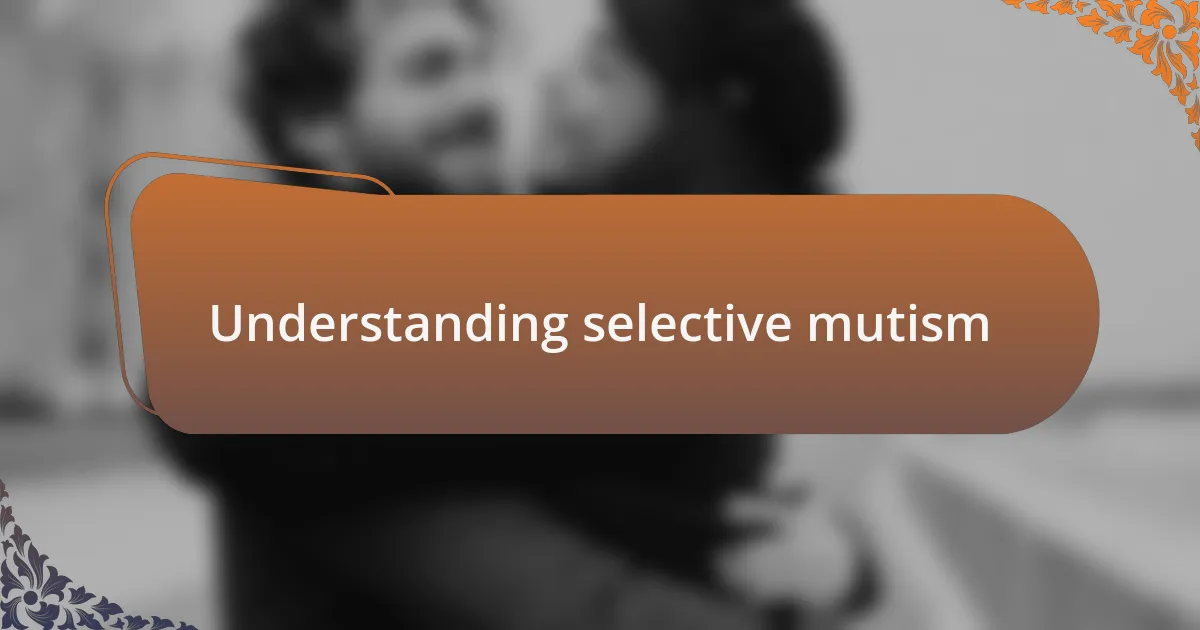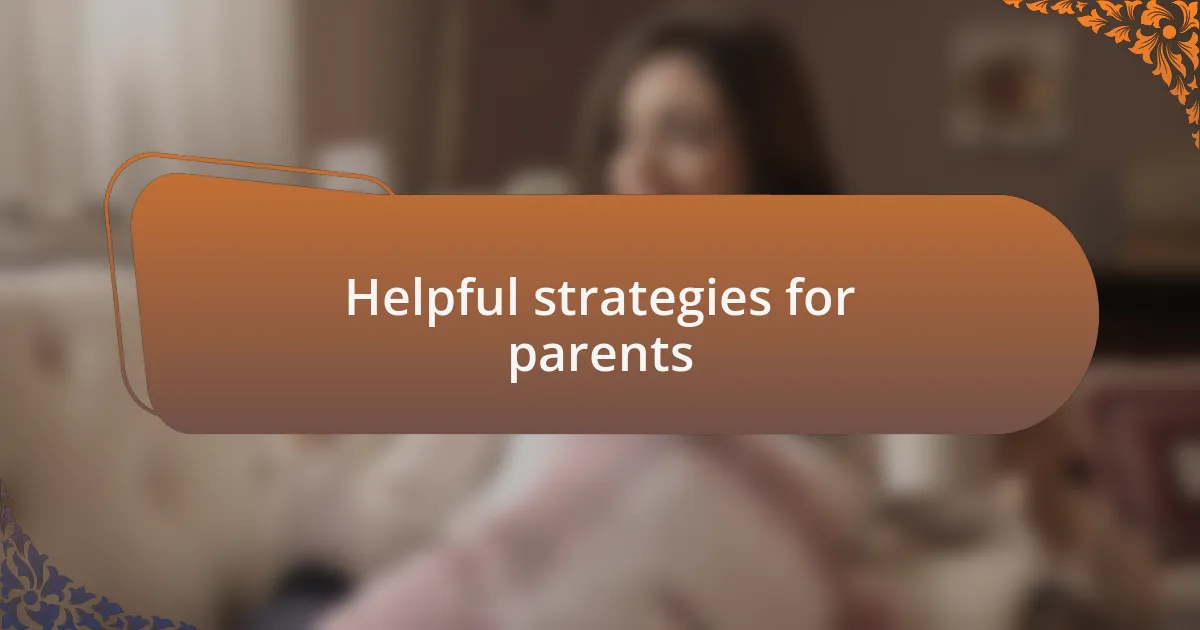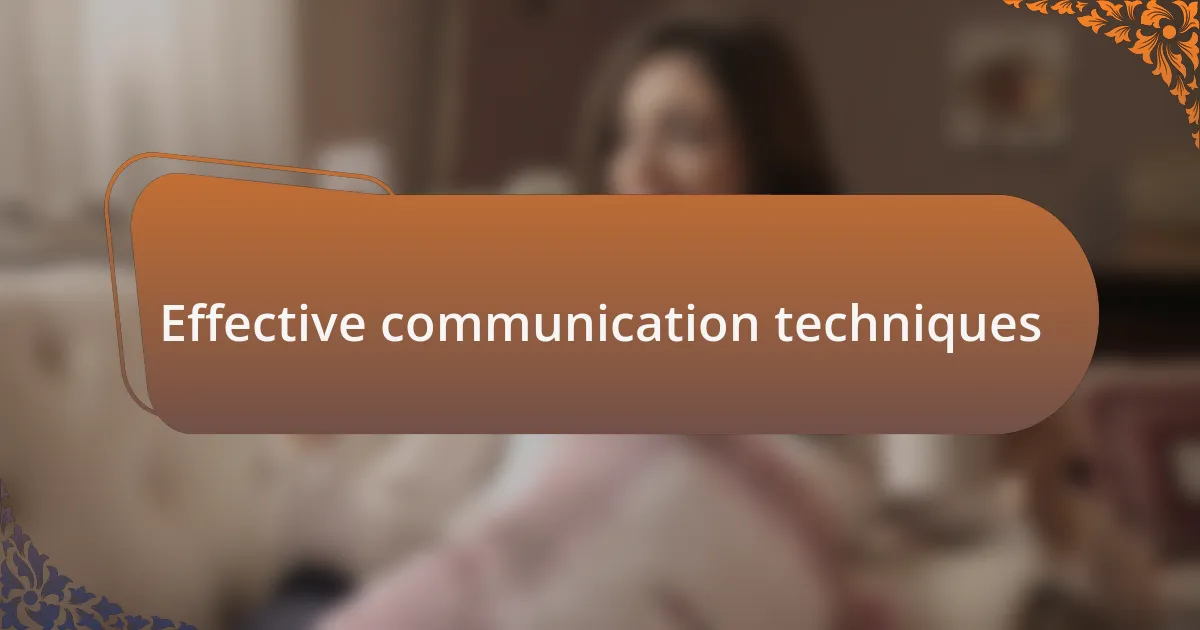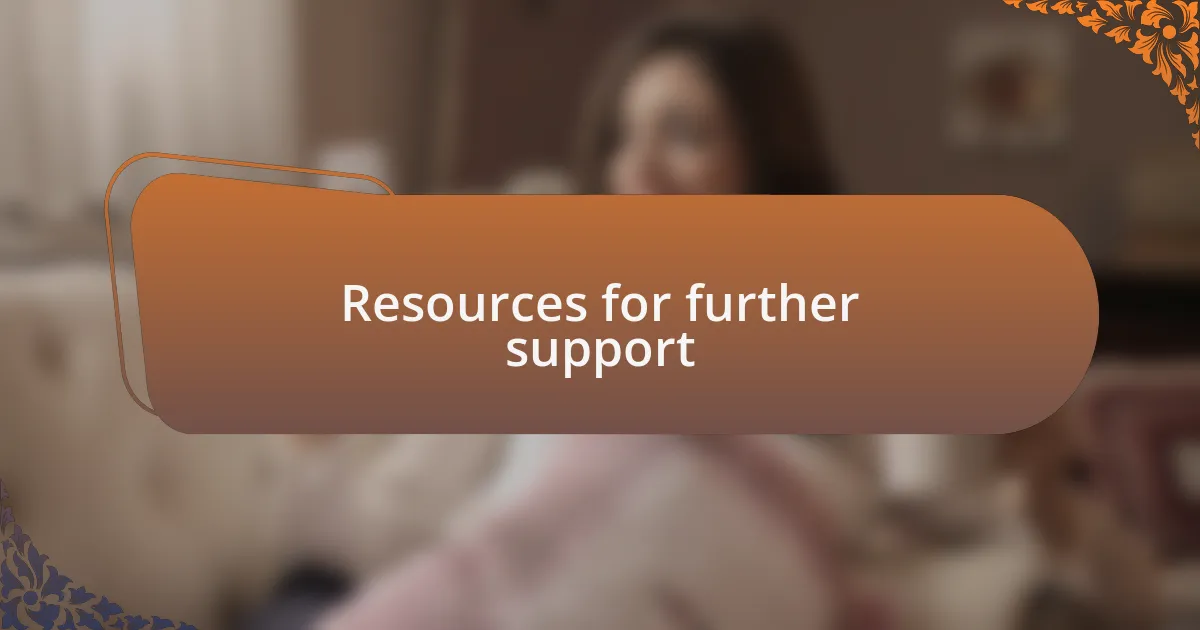Key takeaways:
- Selective mutism is rooted in anxiety, not shyness, requiring understanding and supportive environments.
- Raising awareness can prevent misunderstandings and promote a culture of support for affected children and their families.
- Effective strategies for helping children include low-pressure social interactions, visual aids for communication, and celebrating small milestones.
- Supportive relationships and community resources are crucial for children with selective mutism to find their voice.

Understanding selective mutism
Selective mutism is often misunderstood, leaving many to wonder why a child can speak fluently at home yet becomes silent around peers or in public settings. From my experience volunteering in classrooms, I’ve seen firsthand how a child’s anxiety can transform even the simplest social interactions into monumental challenges. Can you imagine feeling an overwhelming fear that every word you utter might be scrutinized?
It’s important to recognize that selective mutism isn’t just shyness; it stems from deep-rooted anxiety. I once met a young girl who, despite her vibrant personality at home, would freeze in front of her classmates. Witnessing her struggle opened my eyes to the depth of this condition, which can lead to significant isolation and frustration. It made me reflect on how vital it is to create safe spaces for these children, where they feel supported and understood.
The emotional landscape of selective mutism can be quite complex. I recall a parent describing her child’s reluctance to join group activities, highlighting the ripple effects on family dynamics and social engagements. It’s a stark reminder that understanding and empathy are crucial for those navigating this journey. How can we encourage open conversations about feelings, especially for those who find it difficult to express themselves verbally?

Importance of raising awareness
Raising awareness about selective mutism is essential for fostering understanding and empathy within our communities. I remember attending a workshop where a speech therapist shared stories of her clients. Hearing about their struggles and triumphs reminded me how easily misinterpretation can lead to misconceptions, leaving children feeling even more alienated. Have you ever considered how a little awareness could change a child’s experience in school?
One particularly striking moment for me was when a teacher admitted to punishing a child for not speaking up in class. It hit me hard, realizing that such situations arise from a lack of awareness rather than any wrongdoing from the child. It made me think about the shifts we could make if more educators and caregivers understood the signs and intricacies of selective mutism. Isn’t it unsettling to think about how many children suffer due to misunderstandings?
Moreover, awareness promotes a culture of support, encouraging parents and caregivers to seek help without shame. A friend once confided in me about feeling isolated because her child faced social difficulties. This led to her advocating for local support groups, highlighting how essential community networks are. Could you envision the strength of a community that stands together to uplift children facing such challenges? Raising awareness is not just about education; it’s about creating a compassionate environment where every child can thrive.

Recent studies on selective mutism
Recent studies on selective mutism have shed light on effective intervention strategies, helping children feel more empowered in social settings. One study I came across noted that exposure therapy, where children gradually interact in low-stress environments, significantly decreased anxiety levels over time. I was particularly struck by a success story shared by a therapist who had seen a young client transition from complete silence to expressing himself prominently during group activities. Isn’t it heartwarming to think about such growth?
Another fascinating finding emphasized the role of parents in the treatment process. Research indicated that those who actively engaged in therapy alongside their children not only fostered a stronger bond but also enhanced the child’s progress. I recall a parent describing how she sat in on every session, taking notes and practicing strategies at home. This level of involvement can truly make a difference—have you ever thought about how parents can be powerful advocates in their child’s journey?
Furthermore, a recent study highlighted the impact of peer relationships in managing selective mutism. It showed that supportive peers could help create a more inclusive environment, where children feel more comfortable expressing themselves. Hearing about how a group of classmates rallied for a friend and initiated fun, non-verbal communication games brought me joy. Isn’t it remarkable how a little support and understanding from peers can change a child’s experience completely?

Helpful strategies for parents
Finding the right strategies to support a child with selective mutism can be transformative for both the child and the parents. One effective approach I’ve seen is creating a consistent routine that includes regular opportunities for low-pressure social interactions. I remember a parent who established a weekly playdate with just one friend. Over time, this familiar setting helped their child build confidence and gradually start speaking up. Isn’t it amazing how just a small, safe space can foster big changes?
Another strategy worth considering is using visual aids to communicate feelings—something that worked wonders for a friend of mine. She introduced a feelings chart to her child, which allowed him to express his emotions without the added pressure of verbal communication. This simple tool not only encouraged their conversations but also deepened their understanding of each other. Have you ever thought about the power of visuals in bridging communication gaps?
Additionally, patience is key. I can’t stress enough how critical it is for parents to maintain a supportive environment without rushing their child. There was a time when a parent I know made it a point to celebrate every small milestone—whether it was making eye contact or whispering a word. Recognizing these small victories can be a huge motivator for children and reinforce their progress, making the journey not just about overcoming silence but also about celebrating each step forward together. How often do we take the time to appreciate the little things in our children’s journeys?

Effective communication techniques
Effective communication is essential in helping children with selective mutism find their voice. One technique that has proven effective is role-playing scenarios, which I experienced firsthand when a friend initiated a game of ‘pretend restaurant’ with her son. It was remarkable to see him begin to interact by mimicking ordering food and speaking with the ‘waiter’, all within the security of play. Have you ever noticed how children often express themselves more freely when wrapped in the guise of play?
Incorporating story-telling can also enhance communication. I remember an instance where a teacher used storybooks as a bridge to discussions about feelings and social situations. By discussing characters and their challenges, children could articulate their own feelings without the pressure of direct conversation. Isn’t it fascinating how a simple story can unlock pathways to expression and connection?
Moreover, utilizing a buddy system can create a comfortable atmosphere for children. When my niece partnered with a peer during group activities, I watched her gradually open up while feeling less isolated. Sometimes, knowing that another child is there to share the experience can lighten the load of anxiety. Why do we overlook the power of companionship in fostering communication?

Personal reflections on my journey
Reflecting on my journey with selective mutism, I recall the early days when silence felt like a heavy blanket. I vividly remember sitting in the classroom, surrounded by my peers, yearning to speak but feeling an overwhelming sense of fear. Have you ever felt the weight of words trapped inside you, just longing to be set free? It’s a peculiar feeling that feels isolating yet unifying—a shared struggle among many.
I have often found solace in small victories. There was a moment when I surprised myself by sharing a thought during a group project. The warm smiles and encouragement from my classmates lit up the room, and in that instant, I realized that my voice mattered. Doesn’t it feel incredible when others celebrate your efforts, no matter how small they seem? Those moments of acceptance transformed my outlook on communication.
Looking back, I see how pivotal supportive relationships were on my path. I was fortunate to have a mentor who patiently listened rather than pressured me. Through quiet encouragement, she gently nudged me to express myself, helping me understand that my narrative was worth sharing. Isn’t it amazing how the right support can spark a change, even when the journey feels daunting?

Resources for further support
When navigating the complexities of selective mutism, finding reliable resources can be a game changer. I remember feeling lost early on, but discovering support groups online connected me with others who shared similar experiences. Have you ever stumbled across a community that made you feel less alone? Those connections were crucial for me, as they provided a space to discuss our fears and triumphs.
Books can also be an invaluable resource. I often turned to literature that focused on communication challenges and personal growth. It felt comforting to read stories of others who struggled with selective mutism and later found their voices. Reading those narratives helped me see that I wasn’t just a statistic—I was part of a vibrant community of individuals learning to express themselves.
Additionally, seeking professional help can make a significant difference. Therapists who specialize in children’s speech and anxiety disorders can offer tailored strategies to effectively tackle selective mutism. When I started working with a therapist, it felt as if I finally had a trusted guide who understood my journey. Have you ever wished for that kind of support? Having someone by your side who empowers you to speak can transform silence into meaningful conversation.